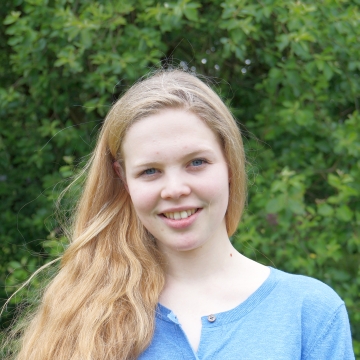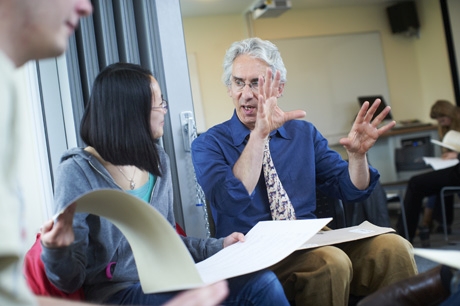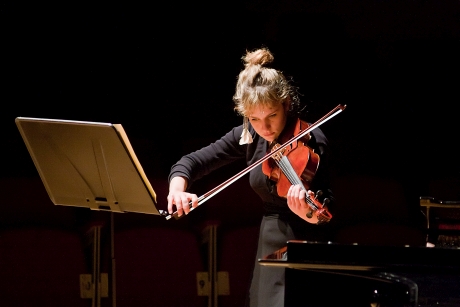View semester dates
.jpg)
BA (Hons) Music
At York, your degree in Music will be as unique as you.
Year of entry: 2026/27
View semester dates
Studying Music at York deepens your understanding of music’s role in the world, enriching our lives and bringing people together.
Why study Music at York?
Our flexible course integrates practical music-making, musicology, analysis, and music technology. Take options in performance, composition, music education, music psychology and more.
York is home to a vibrant music culture. There's a huge range of ensembles to join, from orchestras and choirs to improvisation groups, modular synths and gamelan. You’ll have opportunities to perform in venues ranging from our own concert spaces to the historic York Minster in the city centre. There’s also the YorkConcerts series, societies for bands, Brazilian samba, musical theatre, and regular jazz, folk and open mic events on campus, and across the city.
Get inspired in exceptional facilities. We have a 350-seat concert hall and a state-of-the-art auditorium for the performance of contemporary electronic music and sound art. Our six recording studios span 60 years of recording technology. We have purpose-built practice spaces, music libraries and sound archives. You can borrow orchestral, historical or non-Western instruments.
Get one-to-one tuition and develop your performance to a high level. We’ll also help you gain confidence in analysis, writing, listening and creative exploration. You’ll learn to think critically and creatively about music, write with clarity and insight, and apply aural and academic techniques across a wide range of musical contexts.
Our staff have extensive experience across disciplines, from performance and pedagogy to music psychology, from ancient music to dance music culture. They explore music's relationship with literature, film, philosophy and beyond. They’re award-winning composers and broadcasters, sought-after studio producers, instrumental and vocal teachers, music historians and researchers.
Gain industry connections and prepare for your career. We host workshops, masterclasses and talks with professional partners and artists-in-association, helping you to gain careers advice whilst developing a versatile skillset for progression within the music industry. Our graduates go on to careers in performance, production, education, arts administration, community music, journalism, composition and further study; both within and beyond the music industry.
The incredible facilities, countless ensembles and opportunities really do give you the skills you need to thrive. You’ll improve as a musician, and develop teamwork, leadership and social skills too. Something that really sets York apart from other universities is our Music Education Group (MEG) which offers students the chance to run workshops and play music in primary schools, hospitals, nurseries and care homes across York. This is a vital experience if you are considering teaching as a career.
Course content
BA Music is flexible, meaning you can tailor your studies to what interests you. You'll develop core skills in musicology and analysis, and ensemble and solo performance.
- Year 1 - four core modules and two option modules.
- Year 2 - two core modules and four option modules.
- Year 3 - combine taught option modules with independent study modules to develop your own projects, performances and portfolios.
You will be supported with a bursary for instrumental or vocal lessons; this will be increased if you choose to present a final recital in Year 3.
Year 1
Core modules
- Core Skills for Musical Study
- Listen to This!: Critical Approaches to Music 1
- Creative and Professional Practice 1
- Analyse This!: Critical Approaches to Music 2
Option modules
You will study two option modules. Examples can be found below. Some option module combinations may not be possible. The options available to you will be confirmed after you begin your course.
- Composition 1
- Developing Themes: Music in the Long Nineteenth Century
- Instrumental Music Education
- Introduction to the Psychology of Music
- Musicians' Health and Wellness
- Music’s Meanings
- Performance and Context
- The Body in Musical Performance
- Women Making Music
Academic integrity module
In addition to the above you will also need to complete our online Academic Integrity module.
Year 2
You'll focus on developing your independence, critical thinking and confidence; improving your core skills; and continuing your instrumental/vocal studies. You'll also begin to prepare for your Solo Project, Composition Folio and/or Recital in your final year. The Critical Thinking and Listening module develops critical reflection on music and its performance, while your specialist option modules allow you to explore the areas you are most interested in.
Core modules
Option modules
You will study four option modules. Examples of modules recently offered to Year 2 students can be found below. The options available to you will be confirmed after you begin your course. Some option module combinations may not be possible.
- Chamber Music
- Conducting
- ‘Dancing about Architecture’: Writing about Music
- History of African American Music
- Playing with the Past
- Remix
- Sound Studies
- The Uses of Tonality
- Writing and Producing Songs
Elective modules
You may be able to replace one option module with an elective module, studying a complementary subject, a language or an interdisciplinary topic.
Year 3
During your final year, you'll specialise further with Recital and Composition Folio options alongside your choice of option modules.
You will also have the opportunity to devise, research and produce a Solo Project. Building on skills you've acquired across your degree, this is an opportunity for you to develop a piece of large-scale work that will be useful to your future career. Past Solo Projects have included dissertations, editions, albums, innovative performance events, orchestrations, film music, community music projects and many other types of work.
Core modules
- Extended Recital or Extended Composition Folio or Extended Solo Project
- Creative and Professional Practice 3
Option modules
You will study two option modules. Examples of modules recently offered to Year 1 students can be found below. The options available to you will be confirmed after you begin your course. Some option module combinations may not be possible.
If you wish, you can substitute one of your option module choices for a second block of specialised individual study, through the Recital, Composition Folio, and Solo Project options.
- Advanced Composition
- Analysing Classical Sonatas
- History of Film Music
- Instrumental / Orchestration, or, The Use of Timbre
- Music Education and Social Justice
- Musical Borrowing
- Solo Voice Ensemble Singing
- Sonic Fictions: Technology, Culture & the Future of Music
Elective modules
You may be able to replace one option module with an elective module, studying a complementary subject, a language or an interdisciplinary topic.
Our modules may change to reflect the latest academic thinking and expertise of our staff, and in line with Department/School academic planning.
Learning outcomes
Every course at York has been designed to provide clear and ambitious learning outcomes. These learning outcomes give you an understanding of what you will be able to do at the end of the course. We develop each course by designing modules that grow your abilities towards the learning outcomes and help you to explain what you can offer to employers. Find out more about our approach to teaching and learning.
Learning outcomes for this course
- Understand and engage meaningfully, creatively and critically with a range of music from different traditions and parts of the world, by drawing upon knowledge and experience of music’s histories, its structures and its varied uses.
- Lead, or constructively contribute to, high-level musical activity, for example by performing, composing, listening, thinking critically, analysing, editing, improvising, notating or employing studio techniques and digital literacy at an advanced level.
- Research independently and collaboratively, whether as preparation for postgraduate study or for the workplace environment, with analytical sophistication, close attention to detail and creative flair.
- Apply the musical and transferable skills gained throughout the programme with confidence and aptitude in a range of national and international professional contexts, for example performance, composition, teaching, management, academic work, studio work and community music projects.
- Communicate with clarity and critical insight on a range of issues relating to music, the arts, society and culture, using appropriate written and oral media and music-making activities.
- Approach familiar tasks as well as new and challenging situations with creativity, imagination and initiative, and identify resourceful and entrepreneurial actions that have real benefit for themselves and others.
- Work independently and self-reliantly, and also contribute with purpose and responsibility to different communities through team-working skills that are founded on a commitment to inclusivity and are informed by a deep understanding of the role of music as an expression of culture.

York appealed to me because of the fantastic atmosphere and the excellent course. Our lecturers are down to earth, extremely interesting, and passionate teachers, as well as producing some of the top current research. For students this translates into a stimulating academic environment, offering in-depth insight into a wide variety of topics.
Fees and funding
The fees and funding information here is for students starting in the 2026/27 academic year.
If you take a year abroad or year in industry you'll pay a reduced rate of fees for that year.
Annual tuition fees
| UK (home) | International and EU |
|---|---|
| £9,535 (TBC) | £26,900 |
The UK government has announced its intention to increase tuition fees from £9,535 to £9,790 for the 2026/27 academic year. We expect this to apply to new UK (home) undergraduate students starting their studies in September 2026.
UK (home) or international fees?
The level of fee that you will be asked to pay depends on whether you're classed as a UK (home) or international student. Check your fee status.
Fees for subsequent years
- UK (home) fees may increase within the government fee cap in subsequent academic years. We will notify you of any increase as soon as we can.
- International fees are subject to increase in subsequent years in line with the prevailing Consumer Price Index (CPI) inflation rate (up to a maximum of 10%).
More information
For more information about tuition fees, any reduced fees for study abroad and work placement years, scholarships, tuition fee loans, maintenance loans and living costs see undergraduate fees and funding.
Additional costs
You will be expected to pay for the maintenance of your instruments, equipment and sheet music. You will also need appropriate concert attire throughout your studies, the cost of which will vary depending on what you choose.
If you don't already have them, you will need a laptop capable of running notation and recording software, as well as a set of good quality headphones. The School has a network license for Sibelius which students can use at no extra cost. The School will also provide hearing protection for musicians playing in high-volume settings, but you may choose to purchase your own.
You may also wish to take out specialist insurance if undertaking professional work or travelling with instruments.
If you choose to take a module involving a placement, you will be responsible for the cost of travel, which will vary depending on placement location. If the placement requires a DBS check, this cost will be covered by the School.
Funding
We'll confirm more funding opportunities for students joining us in 2026/27 throughout the year.
- UK government loans
- UK scholarships and bursaries
- International scholarships
- Country-specific funding
- US loans
Subject-specific funding
We offer some scholarships for undergraduate students. See our bursaries for instrumental and vocal studies.
York, Oxford, Cambridge, Imperial
Just four UK universities are rated Gold for teaching and top ten for research* in the latest national assessment exercises.
* Awarded joint 10th in the Times Higher Education ranking of the Research Excellence Framework 2021.
Teaching and assessment
You’ll study and learn with academics who are active researchers and practitioners, experts in their field and have a passion for their subjects. Our approach to teaching will provide you with the knowledge, opportunities, and support you need to grow and succeed in a global workplace.
Teaching format
Expect expert-led teaching, interactive small-group sessions, performance workshops and practical activities embedded throughout the curriculum, with many learning experiences shared across year-groups. Your contact hours include rehearsals, one-to-one supervision, tutorials, and concerts as well as seminars and lectures. Our teaching, and your learning, is shaped by ongoing staff research, ensuring course content evolves and reflects the most up-to-date understanding of a range of specialist fields.
Our staff bring experience from world-class institutions including IRCAM, Abbey Road Studios, the Royal Opera House and BBC Philharmonic.
Our staff have specialisms in:
- DJ pedagogy
- Contemporary and 20th-century opera production
- medieval & ancient music
- Psychology of music
- Conducting
- Spectrum and microtonal composition
- African diasporic music studies
- Dance Music Cultures
- Music, language, and meaning
- Instrumental and vocal teaching
- Relationships between music, literature and philosophy
- String quartet composition
- Music and film
You’ll attend seminars, composition workshops and performance masterclasses led by visiting composers, artists and researchers. Ensemble participation is a core part of the course, with many students joining multiple groups. You’ll also attend professional concerts and can perform in our student-run lunchtime concert series, gaining valuable experience as a performer and organiser.
Timetabled activities
In your first year, you can expect:
| Lectures | 1-2 hours per week |
|---|---|
| Seminars | 8 hours per week |
| Ensembles | 2–3 hours per week minimum, often more if you join additional ensembles (many do) |
| Concerts | 2 hours per week (expected to attend at least 5 concerts per term, but many choose to attend more) |
| Instrumental/Vocal tuition | 1 hour every two weeks, with additional weekly performance classes available |
These figures are representative of a typical week. Your contact hours will vary throughout the year due to your module choices, non-compulsory classes, exam periods and changes to scheduled activities.
Outside your timetabled hours, you'll study independently. This may include preparation for classes, follow-up work, wider reading, practice completion of assessment tasks, or revision.
In the UK, full-time students are expected to spend 1,200 hours a year learning. That's about 40 hours of classes and independent study each week during semesters. Everyone learns at a different rate, so the number of hours you spend on independent study will be different to other students on your course.
Facilities
Our facilities are exceptional. Perform in our 350-seat concert hall and Rymer auditorium, one of the finest listening spaces in the UK. Delve into music history with our extensive library collections and archives. If your passion lies behind the mixing desk, our five recording studios give you access to 60 years of audio recording - from vintage analogue to contemporary digital software integrations. These facilities, and over 35 practice rooms and larger rehearsal spaces, are all bookable for student use.
John Paynter Music Library
The John Paynter Music Library is an elegant facility, located within the University's JB Morrell Library, and houses the main music collections. It is also equipped with digital pianos and media replay equipment. The physical collection as well as an extensive range of electronic resources are searchable through the YorSearch.
Sound Resources
The University Library houses and extensive collection of CDs and DVDs, which are available for listening and research. There are also archival recordings available for student use in the University of York Sound Archives.
Explore our facilities
Teaching location
You will be based in the School of Arts & Creative Technologies, with facilities on Campus West and Campus East. Nearly all of your teaching will take place within the School.
About our campus
Our beautiful green campus offers a student-friendly setting in which to live and study, within easy reach of the action in the city centre. It's easy to get around - everything is within walking or pedalling distance, or you can use the fast and frequent bus service. Take a campus tour.
Assessment and feedback
We don't assess through written exams or set essay titles: instead, you work with your tutors to craft research projects that fit your interests, with opportunities to be assessed through performance, composition or other practical work alongside written submissions. We provide you with the creative flexibility you need to flourish as a musician.

What York does extremely well is offer the resources, teaching and time for students to experiment, discover their voice, and find a niche: something rather important in a climate where just being an excellent violinist/pianist/soprano won’t cut it.
York graduate and award-winning composer and performer
Careers and skills
Our graduates have gone on to roles in major orchestras; arts administration; music education; broadcast journalism and radio production; a range of publishing houses; film, concert and multimedia composition; and a range of fields beyond music. Others undertake further study for an MA, PhD, conservatoire programme or a PGCE.
Career opportunities
York's alumni include:
- Sam Jackson, Controller of BBC Radio 3
- Gillian Moore CBE, Artistic Associate, Southbank Centre
- Anna Meredith MBE, Mercury Prize-nominated composer
- Samantha Ege, internationally-recognised concert pianist and award-winning researcher into the music of Florence Price and the Chicago Black Renaissance
- Joe Walker, Oscar-winning film editor (Dune, Arrival)
- Tom Service, journalist and music critic
Others have gone on to work in:
- Broadcast and media
- Professional performance
- Arts management
- Teaching and community education
- University lecturing
- Music outreach
- Music publishing (most major houses)
- Major music agencies
- Orchestral management
Transferable skills
- Independent thinking
- Teamwork
- Presentation
- Writing
- Critical analysis
- Creative problem-solving
- Communication
Entry requirements
| Qualification | Typical offer |
|---|---|
| A levels | AAB including A in Music If you are not taking A level Music we will accept AAB in three A Levels plus ABRSM or Trinity Grade 5 Theory and Grade 8 Performance. Other equivalent qualifications and exam boards may be considered on a case by case basis. |
| Access to Higher Education Diploma | 36 credits from units awarded Distinction and 9 awarded Merit or higher. An additional A Level or equivalent qualification in Music will be required. |
| BTEC National Extended Diploma | DDD in Music. If you are taking a BTEC in a different subject, an additional A Level or equivalent qualification in Music will be required. |
| European Baccalaureate | 80% overall, including 85% in Music |
| International Baccalaureate | 35 points including 6 in Music at Higher Level |
| T levels | We are currently not accepting T Levels for this course unless an additional A Level (or equivalent qualification) in Music has been taken. |
| Scottish Highers / Advanced Highers | Advanced Highers - B in Music plus Scottish Highers - BBBB We may also be able to consider three Advanced Highers or a combination of Highers and Advanced Highers, where an applicant does not meet the grade requirement through Highers alone. Please contact us to discuss your qualifications. |
| International foundation programme | Foundation Certificate from our International Pathway College or an appropriate alternative. |
| Other international qualifications | Equivalent qualifications from your country |
Alternative offers
Meeting the following additional criteria may qualify you for an alternative offer.
| Criteria | Adjustment |
|---|---|
| Widening participation | BBC including B in Music This is conditional upon successful completion of the WP programme including the YorJourney module (Black Access Programme, Next Step York) or successful completion of Realising Opportunities More about widening participation. |
| Contextual offer | BBB including B in Music |
| EPQ | If you achieve C or higher in the EPQ, you may be eligible for an alternative offer up to one A level grade (or equivalent) below our typical offer. |
| Core Maths | If you achieve B or higher in Core Maths, you may be eligible for an alternative offer up to one A level grade (or equivalent) below our typical offer. |
English language
If English isn't your first language you may need to provide evidence of your English language ability. We accept the following qualifications:
| Qualification | Minimum requirement |
|---|---|
| IELTS (Academic) | 6.5, with a minimum of 6.0 in each component |
| IB English | A score of 4 in English A or 5 in English B (Higher Level or Standard Level) |
| Cambridge CEFR | 176, with a minimum of 169 in each component |
| Oxford ELLT | 7, with a minimum of 6 in each component |
| Oxford Test of English Advanced | 136, with a minimum of 126 in each component |
| Duolingo | Integrated subscores: 120 overall, with a minimum of 105 in each component |
| GCSE/IGCSE/O level English Language (as a first or second language) | Grade C / Grade 4 |
| LanguageCert SELT | B2 with a minimum score of 33/50 in each component |
| LanguageCert Academic | B2 with a minimum score of 33/50 in each component |
| Kaplan Test of English Language | 478 Main Flight score with 444 in each component |
| Skills for English | B2: Merit overall, with Pass with Merit in each component |
| PTE Academic | 61, with a minimum of 55 in each component |
| TOEFL | 87 overall, with a minimum of 21 in each component (taken before January 2026) 4.5 with 5 in Listening and 4.5 in each other component (taken after January 2026) |
| Trinity ISE III | Merit in all components |
| Other English language qualifications | We also accept other English Language qualifications, including various school-leaving certificates. |
For more information see our undergraduate English language requirements.
If you haven't met our English language requirements
You may be eligible for one of our pre-sessional English language courses. These courses will provide you with the level of English needed to meet the conditions of your offer.
The length of course you need to take depends on your current English language test scores and how much you need to improve to reach our English language requirements.
After you've accepted your offer to study at York, we'll confirm which pre-sessional course you should apply to via You@York.
Next steps
Contact us
Get in touch if you have any questions

Department
Related courses
Discover York








